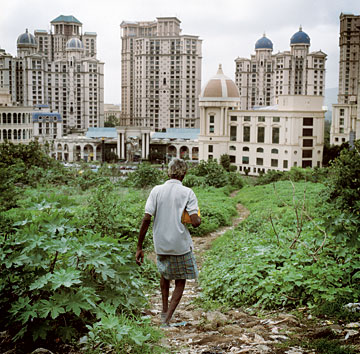
Divided land: In Mumbai, India's boom has widened the gap between rich and poor
(2 of 3)
Diminishing Returns
Even before the economy cracked, there was mounting evidence that, of late, the poor hadn't been enjoying much of the promised gains of globalization. For those on the edges of poverty, life was becoming more difficult. In early 2008, prices for staple food like rice and corn skyrocketed with rising global demand. Higher prices strained already meager incomes and malnourishment increased. Even those whose lives have been improving are not gaining ground as quickly as they might have in the past. Around the world, wage increases have been lagging overall economic growth rates. In a November study, the International Labor Organization (ILO) figured that in Asia, for every percentage-point increase in per capita GDP growth between 2001 and 2007, average wages increased by less than two-thirds of a point. "Workers do not benefit fairly from the enormous growth in the region," says Gyorgy Sziraczki, an ILO economist in Bangkok. "The low-skilled benefit even less."
In other words, the rich have been getting richer faster than the poor. In India, for example, the degree of income inequality in urban centers rose 15% in the decade prior to 2005, according to a study by the New Delhi – based National Council of Applied Economic Research. "Growth is captured by high-income groups," says Shiladitya Chatterjee, the head of the poverty unit at the Asian Development Bank in Manila. "It is not trickling down."
Without a trickle down, the world is getting used to a global army of salaried workers who struggle to support their families — people like 31-year-old Riyanto in Indonesia. Three years ago, Riyanto (like many Indonesians, he goes by one name) landed a job at a South Korean – owned garment factory on the outskirts of Jakarta. Employment in a foreign factory was once a ticket out of poverty. But the $110 a month he earns can barely feed and house his wife and 4-year-old son. The family lives in a rented, 10-ft. by 16-ft. (3 m by 5 m) room divided by a plywood board. If they spend more than $1 a day on food, they run out of money between Riyanto's paychecks. "We only eat chicken once a month, just so that we don't forget how it tastes," he says. "I'm amazed myself that I still survive."
Why the poor now seem to be missing out on the spoils of globalization is a matter of debate among economists. Part of the reason could be the greater use of technology in manufacturing. With factories even in low-wage countries like China and India shifting to higher-tech production methods and products, demand is rising for well-trained engineers and managers — positions out of the reach of unskilled laborers. Moreover, as more nations try to advance, ever more hungry mouths are chasing foreign investment and export sales. There's not enough to go around. Wages grow more slowly. Countries that were late to the globalization party now may never get a foot in the door. Richard Freeman, an economist at Harvard University, says that once the giant, poor population of China entered the fray, it crowded out many other developing countries, especially those with slightly higher costs, such as some Latin American nations. "It's hard to compete if you're higher-wage than [the Chinese] are," Freeman says.
Repair Work
So the Asian way to end poverty needs reform. Governments have become overly dependent on export-led growth, in the process ignoring the needs of those not engaged in industries connected to world trade and investment. That has been especially true in the emerging world's agricultural sectors. One of the forgotten factors underpinning some of the most noteworthy poverty-reduction success stories in countries like Taiwan and Vietnam has been an intensive program of rural development, including land reform and investment in roads and other crucial infrastructure for farmers. But many developing nations have chosen to import food and industrialize rather than invest in agriculture — with devastating consequences. Policymakers' focus on creating urban, industrial jobs "clearly can't be the answer when you have great masses of people existing in the rural areas," says the UNDP's Chhibber.